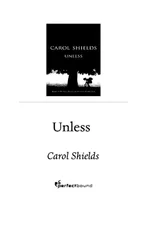Max, with his shy, proud, leftish politics, would never reduce the ill-timing of September 11 to a career complaint, but I know he has felt the injustice of it. I understand exactly how he could have emended the book’s galleys, given a few weeks’ grace, even a few days’, and, having done so, he would have found himself credited by the literary media with a handsome sense of prophecy and the companionable embrace of now that shades, so subtly, toward the current state of inquietude in America at this moment .
Instead, he and his book Flat Planet have been swept into a cave of unfashionable hush, dismissed and somehow made to feel a triviality. Since Flat Planet (those quarreling family members and their generational rivalries and heroic accumulations of wealth), Max has stayed as far as he can from talking to me about his New Manuscript.
Ever since we were married (1957), since the publication of his early Lincoln Park Beatitudes , Max has always had on hand a New Manuscript. That’s part of what I married at the altar of Euclid Methodist Church in Oak Park. He had never made a secret of the fact that he intended to spend his life writing novels; it was certainly not a thing hidden from the new young wife—me—who had pledged herself to be Max Sexton’s muse , even though we never thought of employing the word muse. He believed in my support, and I believed in his ability to have, always, in the rim of his consciousness, a New Manuscript, the future offering, the work with which he was currently engaged and to which I would always take a second place. What did I pledge in return? Nothing, really, except my presence. My abiding presence, the value of which I have recently come to question.
The new, new, New Manuscript lives at this moment in Max’s orange vinyl briefcase (a souvenir bought in a public market in Paris, which he uses for luck), really a child’s 1960ish backpack, a cartable . The manuscript might comprise three pages or three hundred at this point. I haven’t asked. He takes it with him in the morning when he goes to his office, which is a small, comfortless room over a hardware outlet a mere two blocks away on Rush Street.
It is surprising to me that in a busy urban high-tech city we still need a place to buy screws and nuts, nails and hammers. We continue to require these old-fashioned items, as well as a place where they can be procured. You have to enter the revolving door of our very successful local hardware store, then walk by the rubber-smelling stock of garden tools and housewares, then up a set of stairs, to find Max’s office door, a plain gray-painted metal door that opens with difficulty, scraping hard against the cheap tiled floor. There’s a stubby window (glass bricks, gritted with dirt) high up on one wall. There’s a shared bathroom down the hall; Max formerly had to ask one of the cashiers downstairs for a key, but now he has acquired one of his own.
For my husband, Max, spartanness serves as a set of crossed fingers; he mustn’t give way to greed or a taste for luxury, or it will eat him up the way it ate Bellow and Steinbeck. Probably this explains why the two of us have never owned a car, certainly an eccentricity for our generation.
In the late afternoon, after a day at his word processor, he locks his office door with a sigh—or so I imagine—and totes his briefcase down the stairs, across the street and home, and then the two of us sit down in the living room for coffee.
I use freshly ground beans from the freezer, also beautiful Mexican handmade cups and saucers on a polished wooden tray; we deserve this after all our work, and after, in Max’s case, hours of self-denial in his blank cell. What do we talk about?
He seems—I can only guess at this from the way his face relaxes, his tongue caught in silence—to enjoy an account of my day of sonnet-making, as long as I remember to keep my merry voice, but he offers nothing in return about the contents of his briefcase and how the New Manuscript is progressing.
Our Andersonville apartment in the late afternoon catches the full orange of the western sun. This is the old Swedish immigrant neighborhood, now—who knows why?—a refuge for gays and lesbians. Look at us. We are two oldish, coupled heterosexuals drinking coffee after a day of writing, of transposing our thoughts onto the ephemera of paper. One of us speaks of it, and one of us doesn’t. I can’t be sure of holding his interest when I tell him of my daily progress, but he is always eager to hear about—and amused by—the latest news of our Monday meetings of Sonnet Revival. Today was the day when, after all these years, I handed over the society’s chair to another sonneteer, or sonnet-maker as we prefer to be called nowadays, a man named Victor Glantz. Max knows Victor and despises him, yet he inclined his head when Victor’s name came up, eager for details, and anxious, I could see, to avoid any reference to his own working day.
His side trips to the Newbury, his “research,” assure me the New Manuscript is going slowly—and that means badly. Research is a postponement, as I’ve heard Max say a dozen times. A novel is a whole world; there’s so much to get right, but you don’t get it right from reading encyclopedia articles. Sonnets, on the other hand, are an entirely different matter, those little sounds.
I work on my sonnets at a small keyhole desk in a corner of our blue-and-gray bedroom. I actually work with real paper, lined paper from a thick tablet, and a ballpoint pen, with a great many crossings-out and dozens of arrows and question marks and sometimes such marginal scribblings as “No!” or “saccharine” or “derivative,” or else I present myself with that bold command: “Make fresher?” Freshness is the most demanding task one faces when dealing with a traditional meter, no matter how forgiving that meter is.
The first several pages are a mess, but I like to allow the mess to flow and flower. I make it move, sitting back in my chair, rotating my shoulders every half hour or so; I try to unknot my muscles, go, go, go—as long as it is forward. Forget you are a sixty-seven-year-old woman with a girlish white pageboy. Forget all that business about fourteen lines of rhymed iambic pentameter; think of Leonardo and his sage wisdom: “Art breathes from containment and suffocates from freedom.” Or the problems that accrue from the “weight of too much liberty” (Wordsworth). Drown out the noise of rhyme and rhythm. Think only of the small dramatic argument that’s being brought into being—a handball court, or a courtroom itself, hard, demanding thick stone walls—between perseverance and its asymmetrical smash of opposition. Think of that rectangle, perfect in its proportions, that plastic cutlery tray in your kitchen drawer, with its sharp divisions for forks, knives, spoons. Or think of the shape of a human life, which, like it or not, is limited. I believe that humans are meant to live about a hundred years—after that the cells stop wanting to divide and replicate themselves. Chickens, if left alone, will live for thirty years. I wrote a sonnet once about a chicken in great old age, screeching into its decayed wing feathers. Every species has a probable life span, and this observation offers me a verification of sorts for my fourteen-line creations.
From week to week, the subject of my ongoing sonnet suggests itself. It’s as though there’s a small thread clinging to my sweater’s sleeve, always there, waiting to be picked off. I look up from my desk at the framed poster of Rilke’s “Sonnet to Orpheus no. 14” that’s fixed to the wall, and think: this is me. This is I—getting more grammatical, now—my surroundings being a fine-furred extension of myself. These moments of mental vacancy are mine too, and the smothering way, according to Max, I have of signing my letters with amities and my poems with the turn in point of view at about—more or less—the eighth line. Me, always me. My inescapable self with its slightly off-balanced packaging, benignly decentered by an altered view. When I announce my name, Jane Sexton, to new acquaintances, in circumstances formal or informal, my attempt at musical elusion is also part of me, riding up the “a” in Jane, as though a twinkly uncertainty waited, then plunging down into the plainness of Sexton, with its embedded salute to hard churchly labor—the sexton being only a sort of janitor, and wouldn’t I rather have a name like Bishop or Deacon? No, I would not want to lose my bell-ringing, steeple-climbing, altar-dusting self, unconditioned for awe, broken-tongued on the subject of reverence.
Читать дальше












